八年级英语下册第五单元的知识点
英语八年级下册第五单元笔记
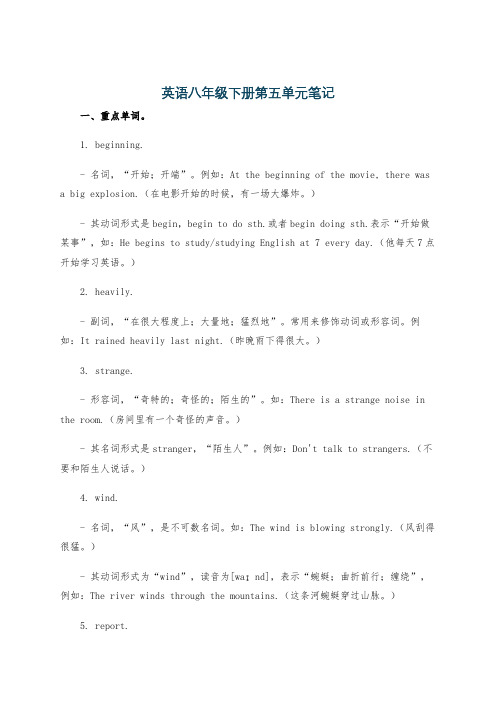
英语八年级下册第五单元笔记一、重点单词。
1. beginning.- 名词,“开始;开端”。
例如:At the beginning of the movie, there was a big explosion.(在电影开始的时候,有一场大爆炸。
)- 其动词形式是begin,begin to do sth.或者begin doing sth.表示“开始做某事”,如:He begins to study/studying English at 7 every day.(他每天7点开始学习英语。
)2. heavily.- 副词,“在很大程度上;大量地;猛烈地”。
常用来修饰动词或形容词。
例如:It rained heavily last night.(昨晚雨下得很大。
)3. strange.- 形容词,“奇特的;奇怪的;陌生的”。
如:There is a strange noise in the room.(房间里有一个奇怪的声音。
)- 其名词形式是stranger,“陌生人”。
例如:Don't talk to strangers.(不要和陌生人说话。
)4. wind.- 名词,“风”,是不可数名词。
如:The wind is blowing strongly.(风刮得很猛。
)- 其动词形式为“wind”,读音为[waɪnd],表示“蜿蜒;曲折前行;缠绕”,例如:The river winds through the mountains.(这条河蜿蜒穿过山脉。
)5. report.- 名词,“报告;报道”。
例如:I read a report about the accident in the newspaper.(我在报纸上读到了一篇关于这个事故的报道。
)- 动词,“报道;公布”。
如:The journalist reported the news on TV.(这位记者在电视上报道了这条新闻。
八年级下册英语第五单元知识点

八年级下册英语第五单元知识点
摘要:
1.条件状语从句
2.half与half of的用法
3.重要短语和句型
正文:
八年级下册英语第五单元主要涉及了以下几个知识点:
1.条件状语从句:if引导的条件状语从句表示“如果”。
构成形式为主句一般将来时时态,if从句一般现在时态,或if从句一般现在时态,主句一般将来时态。
用法:表示假设或条件。
2.half与half of的用法:half为形容词,表示“一半的,半个的”。
half of代词/the名词,表示“一半”。
3.重要短语和句型:
- arrive at/in:到达(小地方用arrive at,大地方用arrive in)
- reach:到达
- get to:到达
- on foot:步行
- at the school gate:在学校大门口
- on weekdays:在平日,工作日
- on weekends:在周末
以下是一个关于这些知识点的实用例子:
假设你是一名学生,有一天你告诉你的朋友:“如果明天不下雨,我们就去公园玩耍。
”这句话中就用到了条件状语从句。
另外,如果你说:“我有一半的作业已经完成了。
”这就是使用了half这个形容词。
而在描述到达某个地方的方式时,你可以用arrive at(如:我昨天到达北京),或reach(如:我昨天到达北京),也可以说get to(如:我昨天到达北京)。
学习这些知识点有助于提高你的英语水平,更好地应对日常学习和生活中的各种场景。
八年级英语下册Unit 5 What were you doing when the rainstorm came重点知识点
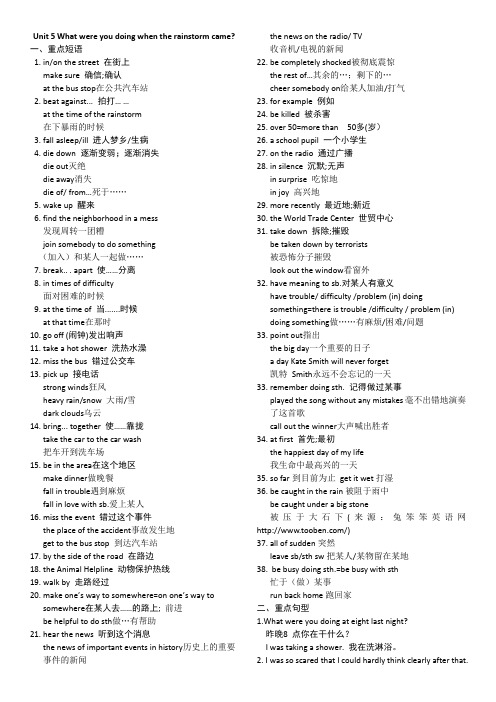
Unit 5 What were you doing when the rainstorm came?一、重点短语1. in/on the street 在街上make sure 确信;确认at the bus stop在公共汽车站2. beat against... 拍打… …at the time of the rainstorm在下暴雨的时候3. fall asleep/ill进人梦乡/生病4. die down 逐渐变弱;逐渐消失die out灭绝die away消失die of/ from…死于……5. wake up 醒来6. find the neighborhood in a mess发现周转一团糟join somebody to do something(加入)和某人一起做……7. break.. . apart 使……分离8. in times of difficulty面对困难的时候9. at the time of 当.......时候at that time在那时10. go off (闹钟)发出响声11. take a hot shower 洗热水澡12. miss the bus 错过公交车13. pick up 接电话strong winds狂风heavy rain/snow 大雨/雪dark clouds乌云14. bring... together 使……靠拢take the car to the car wash把车开到洗车场15. be in the area在这个地区make dinner做晚餐fall in trouble遇到麻烦fall in love with sb.爱上某人16. miss the event 错过这个事件the place of the accident事故发生地get to the bus stop 到达汽车站17. by the side of the road 在路边18. the Animal Helpline 动物保护热线19. walk by 走路经过20. make one’s way to somewhere=on one’s way tosomewhere在某人去……的路上; 前进be helpful to do sth做…有帮助21. hear the news 听到这个消息the news of important events in history历史上的重要事件的新闻the news on the radio/ TV收音机/电视的新闻22. be completely shocked被彻底震惊the rest of…其余的…;剩下的…cheer somebody on给某人加油/打气23. for example 例如24. be killed 被杀害25. over 50=more than 50多(岁)26. a school pupil 一个小学生27. on the radio 通过广播28. in silence 沉默;无声in surprise 吃惊地in joy 高兴地29. more recently 最近地;新近30. the World Trade Center 世贸中心31. take down 拆除;摧毁be taken down by terrorists被恐怖分子摧毁look out the window看窗外32. have meaning to sb.对某人有意义have trouble/ difficulty /problem (in) doingsomething=there is trouble /difficulty / problem (in)doing something做……有麻烦/困难/问题33. point out指出the big day一个重要的日子a day Kate Smith will never forget凯特Smith永远不会忘记的一天33. remember doing sth. 记得做过某事played the song without any mistakes毫不出错地演奏了这首歌call out the winner大声喊出胜者34. at first 首先;最初the happiest day of my life我生命中最高兴的一天35. so far到目前为止get it wet打湿36. be caught in the rain被阻于雨中be caught under a big stone被压于大石下(来源:兔笨笨英语网/)37. all of sudden突然leave sb/sth sw把某人/某物留在某地38.be busy doing sth.=be busy with sth忙于(做)某事run back home跑回家二、重点句型1.What were you doing at eight last night?昨晚8 点你在干什么?I was taking a shower. 我在洗淋浴。
人教版八年级英语下册第五单元知识点汇总总结
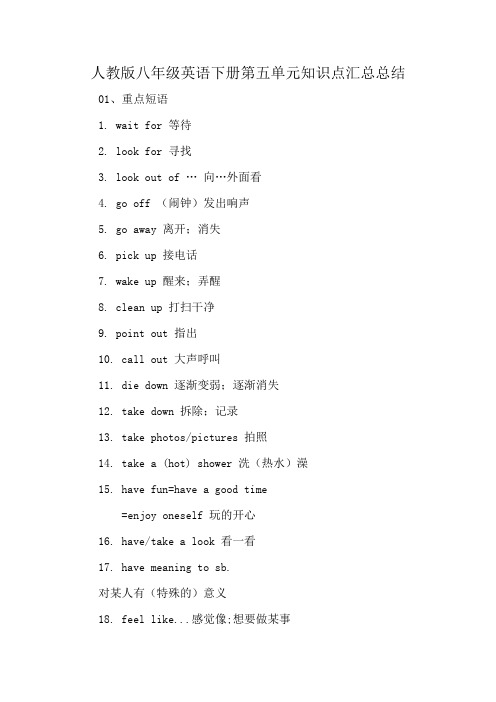
人教版八年级英语下册第五单元知识点汇总总结01、重点短语1. wait for 等待2. look for 寻找3. look out of … 向…外面看4. go off (闹钟)发出响声5. go away 离开;消失6. pick up 接电话7. wake up 醒来;弄醒8. clean up 打扫干净9. point out 指出10. call out 大声呼叫11. die down 逐渐变弱;逐渐消失12. take down 拆除;记录13. take photos/pictures 拍照14. take a (hot) shower 洗(热水)澡15. have fun=have a good time=enjoy oneself 玩的开心16. have/take a look 看一看17. have meaning to sb.对某人有(特殊的)意义18. feel like...感觉像;想要做某事19. make sure 务必,确保20. beat against 敲打21. fall asleep 进入梦乡22. break … apart 使…支离破碎23. turn on打开 (反:turn off关上)24. listen to the radio 听收音机25. get to = arrive in/at 到达26. make one’s way to 前往;费力前行27. to tell the truth 说实话28. walk by 路过29. at the time of …在…的时候30. in a mess 凌乱不堪;乱七八糟31. in times of difficulty 在困难时期32. because of 因为33. in history 在历史上34. in silence 沉默,无声35. at first 起初;起先36. by the side of …在…旁边37. the rest of …剩余的38. each other 互相39. for example 例如40. as well 也02、重点句子Grammar Focus 句子1. What were you doing at eight last night?昨天晚上8点你在做什么?I was taking a shower.我在洗淋浴。
八年级下册英语第五单元知识点
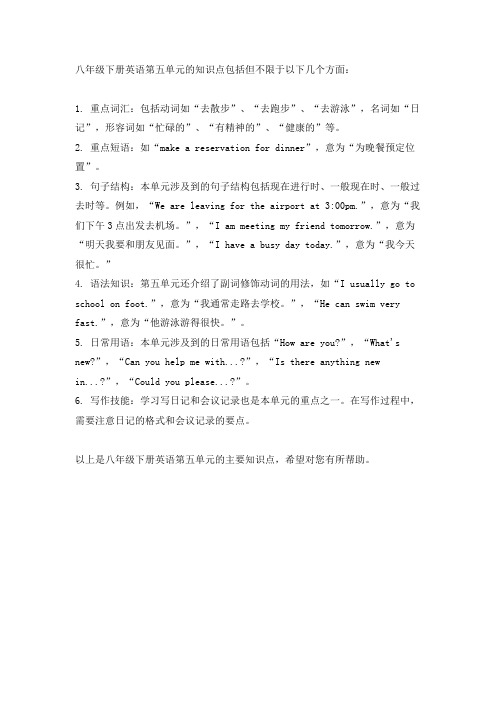
八年级下册英语第五单元的知识点包括但不限于以下几个方面:
1. 重点词汇:包括动词如“去散步”、“去跑步”、“去游泳”,名词如“日记”,形容词如“忙碌的”、“有精神的”、“健康的”等。
2. 重点短语:如“make a reservation for dinner”,意为“为晚餐预定位置”。
3. 句子结构:本单元涉及到的句子结构包括现在进行时、一般现在时、一般过去时等。
例如,“We are leaving for the airport at 3:00pm.”,意为“我们下午3点出发去机场。
”,“I am meeting my friend tomorrow.”,意为“明天我要和朋友见面。
”,“I have a busy day today.”,意为“我今天很忙。
”
4. 语法知识:第五单元还介绍了副词修饰动词的用法,如“I usually go to school on foot.”,意为“我通常走路去学校。
”,“He can swim very fast.”,意为“他游泳游得很快。
”。
5. 日常用语:本单元涉及到的日常用语包括“How are you?”,“What's new?”,“Can you help me with...?”,“Is there anything new in...?”,“Could you please...?”。
6. 写作技能:学习写日记和会议记录也是本单元的重点之一。
在写作过程中,需要注意日记的格式和会议记录的要点。
以上是八年级下册英语第五单元的主要知识点,希望对您有所帮助。
人教版英语八年级下册第五单元语法重点
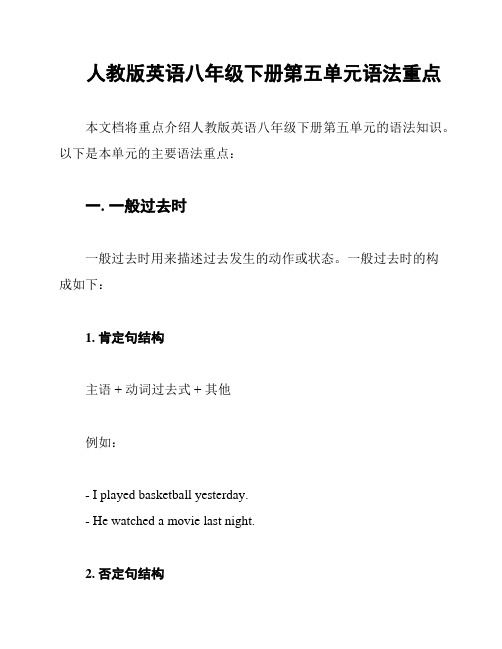
人教版英语八年级下册第五单元语法重点本文档将重点介绍人教版英语八年级下册第五单元的语法知识。
以下是本单元的主要语法重点:一. 一般过去时一般过去时用来描述过去发生的动作或状态。
一般过去时的构成如下:1. 肯定句结构主语 + 动词过去式 + 其他例如:- I played basketball yesterday.- He watched a movie last night.2. 否定句结构主语 + did not + 动词原形 + 其他例如:- I did not play basketball yesterday. - He did not watch a movie last night.3. 疑问句结构Did + 主语 + 动词原形 + 其他?例如:- Did you play basketball yesterday? - Did he watch a movie last night?二. 现在进行时现在进行时用来描述目前正在发生的动作。
现在进行时的构成如下:1. 肯定句结构主语 + am/is/are + 动词-ing + 其他例如:- She is reading a book now.- We are playing soccer at the moment.2. 否定句结构主语 + am not/is not/are not + 动词-ing + 其他例如:- She is not reading a book now.- We are not playing soccer at the moment.3. 疑问句结构Am/is/are + 主语 + 动词-ing + 其他?例如:- Is she reading a book now?- Are we playing soccer at the moment?三. 过去进行时过去进行时用来描述过去某一时刻正在进行的动作。
过去进行时的构成如下:1. 肯定句结构主语 + was/were + 动词-ing + 其他例如:- They were studying English at 8 p.m. yesterday.- He was playing video games when I called him.2. 否定句结构主语 + was not/were not + 动词-ing + 其他例如:- They were not studying English at 8 p.m. yesterday. - He was not playing video games when I called him.3. 疑问句结构Was/were + 主语 + 动词-ing + 其他?例如:- Were they studying English at 8 p.m. yesterday?- Was he playing video games when I called him?以上是人教版英语八年级下册第五单元的语法重点。
八年级下册人教版英语unit5知识点

八年级下册人教版英语unit5知识点Unit 5 Knowledge Points in Grade 8 of People's Education PressUnit 5 in Grade 8 of People's Education Press English textbook covers a variety of topics. In this article, we will explain the key knowledge points of this unit to help you better understand and learn English.Part 1: Grammar1. The present perfect tenseThe present perfect tense is used to describe past actions or experiences that have a connection to the present. It is formed by using "have/has" and the past participle of the main verb. For example:I have played soccer before. (The action of playing soccer happened in the past, but the speaker's experience of playing soccer has a connection to the present.)2. The past perfect tenseThe past perfect tense is used to describe an action that happened before another action in the past. It is formed by using "had" and the past participle of the main verb. For example:She had finished her homework before she watched TV. (Finishing homework happened before watching TV in the past.)3. Passive voiceThe passive voice is used to show that the subject of the sentence is receiving the action, rather than doing the action. It is formed by using "be" and the past participle of the main verb. For example:The cake was made by Tom. (The subject "the cake" is receiving the action of being made by Tom.)Part 2: Vocabulary1. Adjectives for describing personalitiesIn unit 5, you will learn about various adjectives that can be used to describe personalities, such as:- Confident- Responsible- Outgoing- Shy- Friendly- Creative2. Phrasal verbsPhrasal verbs are idiomatic phrases that consist of a verb and one or more prepositions or adverbs. In unit 5, you will learn about some common phrasal verbs, such as:- Look up (to search for information)- Put on (to wear)- Take off (to remove)- Get along (to have a good relationship with someone)Part 3: Reading and Writing1. Writing a narrative paragraphIn unit 5, you will learn how to write a narrative paragraph, which tells a story or an event. A narrative paragraph should have a clear beginning, middle, and end, as well as detailed descriptions and sensory language to engage the reader.2. Reading comprehension strategiesReading comprehension strategies are techniques that help you better understand what you are reading. In unit 5, you will learn about some important strategies, such as:- Predicting- Visualizing- Summarizing- Asking questions- Making connectionsConclusionUnit 5 in Grade 8 of People's Education Press English textbook covers a diverse range of topics, including grammar, vocabulary, reading, and writing. By mastering the key knowledge points of this unit, you will have a better understanding of English and be able to communicate more effectively.。
八下英语第五单元知识点
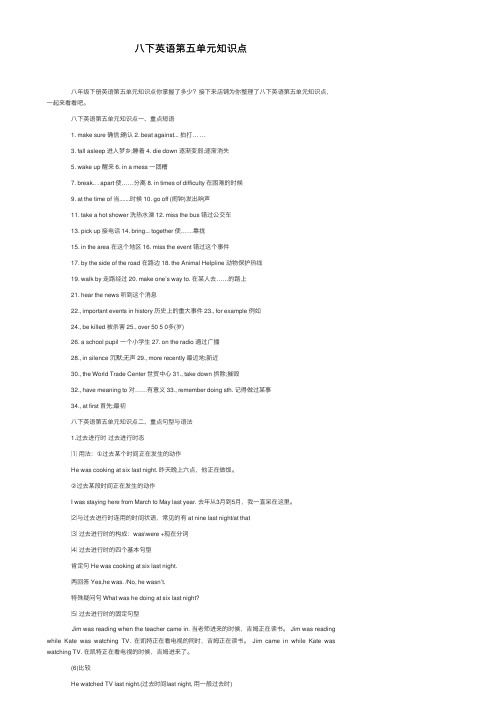
⼋下英语第五单元知识点 ⼋年级下册英语第五单元知识点你掌握了多少?接下来店铺为你整理了⼋下英语第五单元知识点,⼀起来看看吧。
⼋下英语第五单元知识点⼀、重点短语1. make sure 确信;确认2. beat against... 拍打… …3. fall asleep 进⼈梦乡;睡着4. die down 逐渐变弱;逐渐消失5. wake up 醒来6. in a mess ⼀团糟 7. break.. . apart 使……分离 8. in times of difficulty 在困难的时候 9. at the time of 当.......时候 10. go off (闹钟)发出响声 11. take a hot shower 洗热⽔澡 12. miss the bus 错过公交车 13. pick up 接电话 14. bring... together 使……靠拢 15. in the area 在这个地区 16. miss the event 错过这个事件 17. by the side of the road 在路边 18. the Animal Helpline 动物保护热线 19. walk by ⾛路经过 20. make one’s way to. 在某⼈去……的路上 21. hear the news 听到这个消息 22., important events in history 历史上的重⼤事件 23., for example 例如 24., be killed 被杀害 25., over 50 5 0多(岁) 26. a school pupil ⼀个⼩学⽣ 27. on the radio 通过⼴播 28., in silence 沉默;⽆声 29., more recently 最近地;新近 30., the World Trade Center 世贸中⼼ 31., take down 拆除;摧毁 32., have meaning to 对……有意义 33., remember doing sth. 记得做过某事 34., at first ⾸先;最初 ⼋下英语第五单元知识点⼆、重点句型与语法 1.过去进⾏时过去进⾏时态 ⑴⽤法:①过去某个时间正在发⽣的动作 He was cooking at six last night. 昨天晚上六点,他正在做饭。
新版八年级英语下册第五单元知识点归纳

新版八年级英语下册第五单元知识点归纳新版八年级英语下册第五单元知识点归纳Unit hat ere u ding hen the rainstr ae?一基础知识讲解hat ere peple ding esterda at the tie f the rainstr?昨天当暴风雨临的时候人们正在做些什么?【解析1】过去进行时过去进行时态⑴用法:①过去某个时间正在发生的动作He as ing at six last night 昨天晚上六点,他正在做饭。
②过去某段时间正在发生的动作I as staing here fr arh t a last ear去年从3月到月,我一直呆在这里。
⑵与过去进行时连用的时间状语,常见的有at nine last night/ at that tie= then/at this tie esterda /或有hen the teaher ae in/ hile he as reading的提示⑶过去进行时的构成:as\ere +现在分词⑷过去进行时的四个基本句型肯定句He as ing at six last night否定句He as nt ing at six last night一般疑问句as he ing at six last night?两回答es ,he as N, he asn’t特殊疑问句hat as he ding at six last night?⑸过去进行时的固定句型i as reading hen the teaher ae in 当老师进的时候,吉姆正在读书。
i as reading hile ate as athing TV在凯特正在看电视的同时,吉姆正在读书。
i ae in hile ate as athing TV 在凯特正在看电视的时候,吉姆进了。
⑹请比较He athed TV last night (过去时间last night, 用一般过去时)He as athing TV at nine last night (过去时间last night+点时间at nine, 用过去进行时)【2013浙江杭州4】Sall t a pht f her friends hile the _________ puter gaesA plaB are plaing have plaed D ere plaing【2013黑龙江绥化3】unle ____ bs in the r at this tie esterdaA as seeingB is reading as reading【2013黑龙江齐齐哈尔3】hat ____ u _____ hen the aptain ae in?A are; dingB did; d ere; ding巩固练习:用所给动词的适当形式填空1 N i’s sister __________________(read) nespapers2He __________________(ath)TV at nine last night3He __________________(ath)TV last night4 hat __________________the tins __________________(d) then?— ________Lil ______________(dra) a at hen the teaher ae in ? — N, she _________6 __________________u __________________(have) supper at that tie?7 a __________________(nt read) a b at nine esterda evening8 N i __________________(pla) basetball n the plagrund(操场)9 hat ___________________ he _______________ (d) at nine ’l last night10 The ___________________ (listen) t the usi at that tie11 hen the teaher ae in, the students ___________________ (read) the text12 e ___________________ (ath) TV hen suddenl the telephne rang13 Her ther ____________() hile her father as athing TV【解析2】at the tie f 在的时候(常用于过去进行时)【解析3】rainstr n 暴风雨rainat 雨衣raindrp雨滴2 alar didn’t g ff s I ___ up late 我的闹钟没有响,因此我____晚了。
八年级下册英语第五单元知识点
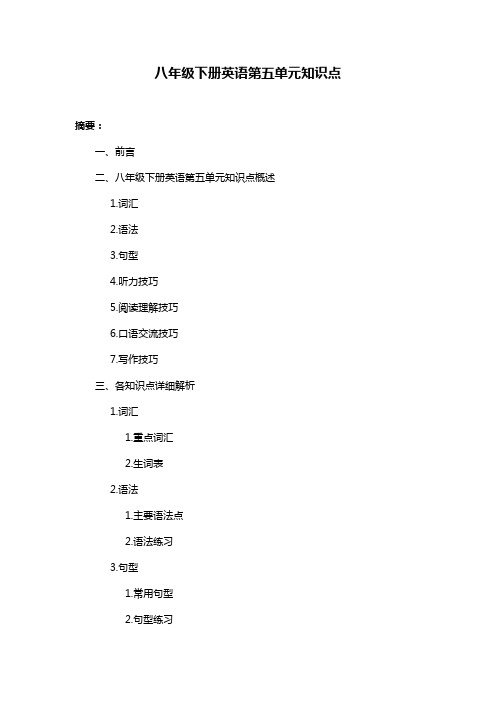
八年级下册英语第五单元知识点摘要:一、前言二、八年级下册英语第五单元知识点概述1.词汇2.语法3.句型4.听力技巧5.阅读理解技巧6.口语交流技巧7.写作技巧三、各知识点详细解析1.词汇1.重点词汇2.生词表2.语法1.主要语法点2.语法练习3.句型1.常用句型2.句型练习4.听力技巧1.听力训练方法2.听力材料5.阅读理解技巧1.阅读策略2.阅读材料6.口语交流技巧1.口语练习方法2.口语话题7.写作技巧1.写作要点2.写作练习四、总结正文:一、前言八年级下册英语是中学英语学习的重要阶段,第五单元的知识点是学生必须掌握的内容。
本篇文章将详细解析该单元的各个知识点,帮助学生更好地学习和掌握。
二、八年级下册英语第五单元知识点概述1.词汇本单元的重点词汇包括日常生活、学校、家庭等主题相关的词汇。
学生需要熟练掌握这些词汇,并学会运用。
2.语法本单元的语法主要包括一般现在时、一般过去时和一般将来时的运用,以及现在进行时、过去进行时和将来进行时的运用。
3.句型本单元的常用句型包括疑问句、祈使句、感叹句等。
学生需要熟练掌握这些句型,并能在实际情景中运用。
4.听力技巧本单元的听力材料主要涉及日常生活话题,学生需要通过听力训练提高自己的英语听力水平。
5.阅读理解技巧本单元的阅读材料主要是关于日常生活、学校、家庭等主题的文章。
学生需要学会阅读策略,提高阅读理解能力。
6.口语交流技巧本单元的口语练习主要是关于日常生活、学校、家庭等主题的对话。
学生需要学会用英语进行日常交流。
7.写作技巧本单元的写作要点主要是如何描述日常活动、学校生活、家庭等。
学生需要学会如何用英语进行写作。
三、各知识点详细解析1.词汇1.1 重点词汇- 食物:rice, bread, cake, egg, meat, fish, fruit, milk, water- 日常活动:play, read, write, listen, speak, watch, do, go1.2 生词表- 略2.语法2.1 主要语法点- 一般现在时:主语+ 动词原形/三单形式- 一般过去时:主语+ 动词过去式- 一般将来时:主语+ 情态动词+ 动词原形- 现在进行时:主语+ be 动词+ 动词ing 形式- 过去进行时:主语+ was/were + 动词ing 形式- 将来进行时:主语+ will be + 动词ing 形式2.2 语法练习- 略3.句型3.1 常用句型- 疑问句:Be 动词+ 主语+ 地点/时间/方式?- 祈使句:动词原形/情态动词+ 主语+ 地点/时间/方式- 感叹句:What a/an + adj.+ 可数名词单数+ 主语+ 谓语!。
人教版八年级下册英语Unit5知识点总结

人教版八年级下册英语Unit5知识点总结一、语法知识点A部分知识点1.过去进行时❶ 去进行时的构成及用法过去进行时由“助动词(was/were)+动词-ing”构成,表示在过去某一时刻或某一时间段正在进行的动作。
这一特定的过去时间除有上下文暗示以外,一般用过去的时间状语来表示。
如:then, at that time, at this time yesterday, at 10:00 yesterday morning, all right以及when/while从句等。
❶ 表示过去时间点正在进行的动作。
此时常伴明确的过去时间点等。
eg:She was reading a book at this time yesterday.昨天这个时候她正在看书。
(过去时间点正在进行的动作)I was watching TV then. 那时我正在看电视。
(过去时间点正在进行的动作)❶ 表示过去的某个阶段持续的动作。
eg:She was watching TV when the phone rang.(过去一段时间内持续的动作)她正在看电视,这时电话铃响了。
❶ 表示这一阶段反复发生的动作,带有褒贬感情色彩。
此时常伴有频度副词always等。
eg:The girl was always changing her mind.(过去反复发生的动作,带有感情色彩)这个女孩老是改变主意。
❶ 表示过去动作延迟到以后发生,即用过去进行表过去将来,此类动词是一些位置的变化的词。
eg:He told me that he was going soon.(过去进行表将来)他告诉我他很快就要走了。
❶ 过去进行时的一般疑问句句型:Be(Was/Were)+主语+现在分词+其他?肯定回答:Yes,主语+be(was/were).否定回答:No,主语+be(was/were) not.eg:--Were you cooking at that time? 那时,你在做饭吗?--Yes, I were.是的。
(完整版)人教版新目标八年级下册英语Unit5知识点

(完整版)人教版新目标八年级下册英语Unit5知识点人教版新目标八年级下册英语Unit5知识点Unit 5内容简介本单元主要介绍了关于过去事件的讨论和描述。
学生研究了过去完成时的用法,掌握了过去完成时态的构成、肯定句、否定句和疑问句的用法,并通过例句和练加深了对过去完成时的理解。
同时,学生还研究了如何根据图片提示以及其他相关信息准备口头报告。
Unit 5知识点总结1. 过去完成时态(Past Perfect Tense)- 过去完成时态表示在过去某一时间或动作之前已经发生或完成的动作或状态。
- 构成:had + 过去分词(had是过去完成时的助动词,根据主语变化,后接过去分词构成谓语)- 肯定句结构:主语 + had + 过去分词 + 其他- 否定句结构:主语 + hadn't + 过去分词 + 其他- 疑问句结构:Had + 主语 + 过去分词 + 其他?2. 过去完成时态的用法- 用于表示已经发生或完成的动作或状态,强调动作发生在过去某个时间之前。
- 指示两个过去发生的动作中,先发生的动作使用过去完成时,后发生的动作使用一般过去时。
Unit 5附加题目请回答以下问题:1. 过去完成时态的构成是什么?2. 过去完成时态的肯定句结构是什么?3. 过去完成时态可以用来表示什么?问题回答1. 过去完成时态的构成是had + 过去分词。
2. 过去完成时态的肯定句结构是主语 + had + 过去分词 + 其他。
3. 过去完成时态可以用来表示在过去某一时间或动作之前已经发生或完成的动作或状态。
人教版八年级下册英语Unit 5单元语法知识点总结
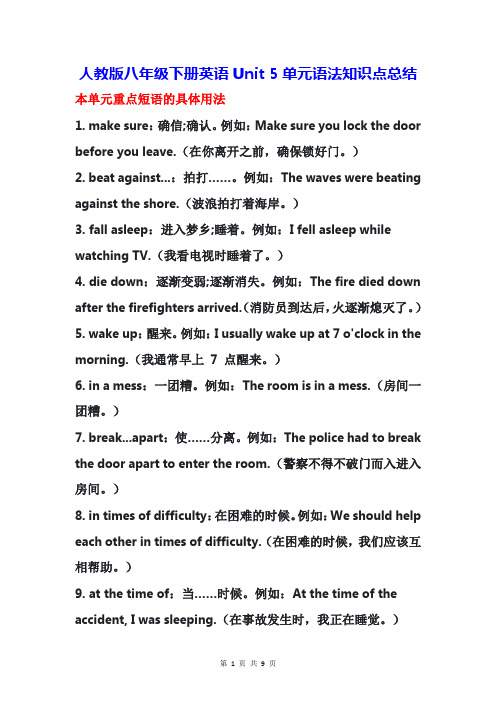
人教版八年级下册英语Unit 5单元语法知识点总结本单元重点短语的具体用法1. make sure:确信;确认。
例如:Make sure you lock the door before you leave.(在你离开之前,确保锁好门。
)2. beat against...:拍打……。
例如:The waves were beating against the shore.(波浪拍打着海岸。
)3. fall asleep:进入梦乡;睡着。
例如:I fell asleep while watching TV.(我看电视时睡着了。
)4. die down:逐渐变弱;逐渐消失。
例如:The fire died down after the firefighters arrived.(消防员到达后,火逐渐熄灭了。
)5. wake up:醒来。
例如:I usually wake up at 7 o'clock in the morning.(我通常早上7 点醒来。
)6. in a mess:一团糟。
例如:The room is in a mess.(房间一团糟。
)7. break...apart:使……分离。
例如:The police had to break the door apart to enter the room.(警察不得不破门而入进入房间。
)8. in times of difficulty:在困难的时候。
例如:We should help each other in times of difficulty.(在困难的时候,我们应该互相帮助。
)9. at the time of:当……时候。
例如:At the time of the accident, I was sleeping.(在事故发生时,我正在睡觉。
)10. go off:(闹钟)发出响声。
例如:The alarm went off at 6 o'clock.(闹钟在6 点钟响了。
八年级英语下册Unit-5知识点总结Unit5-What-were-you-doing-when-the-rainstorm-came

八年级英语下册Unit-5知识点总结Unit5-What-were-you-doing-w hen-the-rainstorm-cameUnit5 What were you doing when the rainstorm came?一.基础知识讲解.What were people doing yesterday at the time of the rainstorm?昨天当暴风雨来临的时候人们正在做些什么?【解析1】过去进行时过去进行时态⑴ .用法:①过去某个时间正在发生的动作He was cooking at six last night. 昨天晚上六点,他正在做饭。
②过去某段时间正在发生的动作I was staying here from March to May last year.去年从3月到5月,我一直呆在这里。
⑵ .与过去进行时连用的时间状语,常见的有at nine last night/ at that time= then/at this time yesterday /或有when the teacher came in/ while he was reading的提示⑶过去进行时的构成:was\were +现在分词⑷过去进行时的四个基本句型肯定句He was cooking at six lastnight.否定句He was not cooking at six last night.一般疑问句Was he cooking at six last night?两回答Yes ,he was. No, he wasn’t.特殊疑问句What was he doing at six last night?⑸过去进行时的固定句型Jim was reading when the teacher came in. 当老师进来的时候,吉姆正在读书。
Jim was reading while Kate was watching TV.在凯特正在看电视的同时,吉姆正在读书。
unit5八年级下知识点

unit5八年级下知识点Unit 5 八年级下知识点八年级下学期的 Unit 5 是关于过去完成时态的学习。
这个学习单元涉及了一系列的语法知识点,包括用法、结构和标志词等,下面我们逐一进行探讨。
一、用法1. 表示过去某个时间以前已经完成的动作或状态,常与过去时态连用。
例如:- By the time I got to the cinema, the film had started.- When we arrived at the restaurant, they had already finished eating.2. 强调“过去完成”的动作或状态,尤其是在时间、条件等表达中。
例如:- If he had studied harder, he would have passed the exam. - After he had finished his homework, he went to bed.二、结构过去完成时态的结构为 had + 过去分词。
例如:- She had finished her work by the time we arrived.- They had already left when we got there.三、标志词过去完成时态有一些常见的标志词,如:before, after, by, until, already, just, never, ever, recently, etc.例如:- I had never seen such a beautiful sunset before.- They had just arrived when the storm hit.以上就是八年级下学期的 Unit 5 关于过去完成时态的知识点了。
希望同学们能够认真学习和理解这些语法知识,加强自己的英语语法能力,提高英语水平。
八年级下册英语第五单元知识点
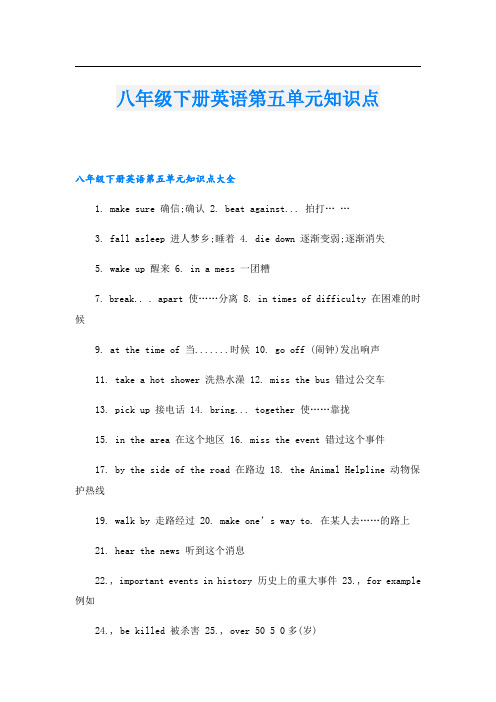
八年级下册英语第五单元知识点八年级下册英语第五单元知识点大全1. make sure 确信;确认2. beat against... 拍打……3. fall asleep 进人梦乡;睡着4. die down 逐渐变弱;逐渐消失5. wake up 醒来6. in a mess 一团糟7. break.. . apart 使……分离 8. in times of difficulty 在困难的时候9. at the time of 当.......时候 10. go off (闹钟)发出响声11. take a hot shower 洗热水澡 12. miss the bus 错过公交车13. pick up 接电话 14. bring... together 使……靠拢15. in the area 在这个地区 16. miss the event 错过这个事件17. by the side of the road 在路边 18. the Animal Helpline 动物保护热线19. walk by 走路经过 20. make one’s way to. 在某人去……的路上21. hear the news 听到这个消息22., important events in history 历史上的重大事件 23., for example 例如24., be killed 被杀害 25., over 50 5 0多(岁)26. a school pupil 一个小学生 27. on the radio 通过广播28., in silence 沉默;无声 29., more recently 最近地;新近30., the World Trade Center 世贸中心 31., take down 拆除;摧毁32., have meaning to 对……有意义 33., remember doing sth. 记得做过某事34., at first 首先;最初学好英语的四个环节是什么1、自觉预习。
人教版八年级英语下册第五单元知识点总结
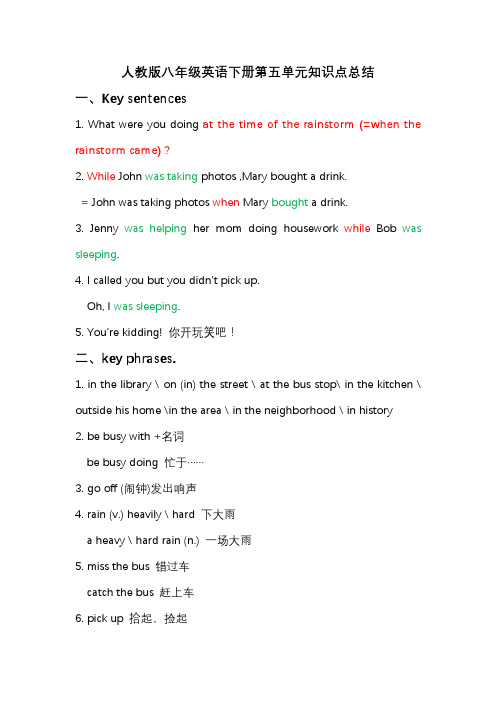
人教版八年级英语下册第五单元知识点总结一、Key sentences1. What were you doing at the time of the rainstorm (=when the rainstorm came) ?2. While John was taking photos ,Mary bought a drink.= John was taking photos when Mary bought a drink.3. Jenny was helping her mom doing housework while Bob was sleeping.4. I called you but you didn’t pick up.Oh, I was sleeping.5. You’re kidding! 你开玩笑吧!二、key phrases.1. in the library \ on (in) the street \ at the bus stop\ in the kitchen \ outside his home \in the area \ in the neighborhood \ in history2. be busy with +名词be busy doing 忙于……3. go off (闹钟)发出响声4. rain (v.) heavily \ hard 下大雨a heavy \ hard rain (n.) 一场大雨5. miss the bus 错过车catch the bus 赶上车6. pick up 拾起,捡起pick up the phone = answer the phone 接电话pick sb up 开车接某人7. bring sth together 把某物聚在一起bring sb together 把某些人聚到一起;使某些人团结起来8. make sure 尽力做到; 确保; 务必be sure 相信;确信9. make \ cook dinner 做晚饭10. beat against 拍打11. at first 起先(下文要转折,first 强调顺序)12. fall \go asleep =go \get to sleep 入睡13. die down 减弱;平息14. at around \ about 3 o’clock 在大约三点15. break...apart 分裂;解体16. by the side of the road 在路边17. walk by 走路经过18. be \ get killed 被谋杀;被害19. the rest =the other \others 剩下;剩余20. in silence 沉默21. take down 1) 摧毁;拆除2)取下;记下22. have meaning to 对……有意义23. look out 小心;当心look out of 向…… 外看24. by sb 被某人;由某人25. tell the truth 说实话tell a lie 说谎26. as well 也27. couldn’t \wouldn’t believe 难以相信28. make one's way to.... 在某人去……的路上29. in a mess 一团糟;乱七八糟30. the Animal Helpline 动物保护热线the World Trade Center 世贸中心31 point out 指出point at 指向(近)point to 指向(远)32. remember doing sth. 记得做过某事remember to do sth. 记得去做某事33. join sb to do (join sb for +n) 和某人一起做某事33. Recycling :wait for \ wake up \ look for \ take a shower \ help with \pieces of \ feel like \ play a card game \ for example \ have a look\ have trouble (in) doing sth. =have problems/difficulty (in) doing sth做某事有困难或麻烦三、key points1. 辨析:when while(1)表示“当……的时候”,如后面连接的动词为进行时态,则用while多于用when。
八年级下册英语第五单元知识点笔记
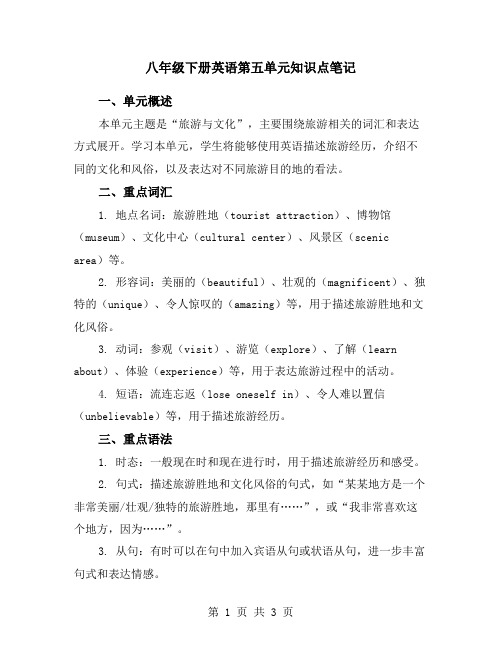
八年级下册英语第五单元知识点笔记一、单元概述本单元主题是“旅游与文化”,主要围绕旅游相关的词汇和表达方式展开。
学习本单元,学生将能够使用英语描述旅游经历,介绍不同的文化和风俗,以及表达对不同旅游目的地的看法。
二、重点词汇1. 地点名词:旅游胜地(tourist attraction)、博物馆(museum)、文化中心(cultural center)、风景区(scenic area)等。
2. 形容词:美丽的(beautiful)、壮观的(magnificent)、独特的(unique)、令人惊叹的(amazing)等,用于描述旅游胜地和文化风俗。
3. 动词:参观(visit)、游览(explore)、了解(learn about)、体验(experience)等,用于表达旅游过程中的活动。
4. 短语:流连忘返(lose oneself in)、令人难以置信(unbelievable)等,用于描述旅游经历。
三、重点语法1. 时态:一般现在时和现在进行时,用于描述旅游经历和感受。
2. 句式:描述旅游胜地和文化风俗的句式,如“某某地方是一个非常美丽/壮观/独特的旅游胜地,那里有……”,或“我非常喜欢这个地方,因为……”。
3. 从句:有时可以在句中加入宾语从句或状语从句,进一步丰富句式和表达情感。
四、知识点笔记1. 词汇用法:要正确使用地点名词和形容词,描述旅游胜地和文化风俗的美丽、壮观和独特之处。
同时,注意动词的时态和语态,表达自己在旅游过程中的活动和感受。
2. 句式结构:掌握常见的旅游相关句式结构,如“我推荐这个地方/这个景点/这个活动……”;“我认为这个地方/这个景点/这个活动……”,以及“我认为这个地方/这个景点应该被更多人知道”等。
3. 从句运用:适当使用从句可以增加句子的复杂性和表达的丰富性。
在旅游英语中,常用的从句有宾语从句、状语从句和定语从句。
例如,“当我来到这个地方时,我被它的美丽/壮观/独特之处深深吸引”或“当我参观博物馆时,我了解到了很多关于……的知识”。
- 1、下载文档前请自行甄别文档内容的完整性,平台不提供额外的编辑、内容补充、找答案等附加服务。
- 2、"仅部分预览"的文档,不可在线预览部分如存在完整性等问题,可反馈申请退款(可完整预览的文档不适用该条件!)。
- 3、如文档侵犯您的权益,请联系客服反馈,我们会尽快为您处理(人工客服工作时间:9:00-18:30)。
八年级英语下册第五单元的知识点
1.If引导的条件状语从句:1)构成:if引导的条件状语从句表示“如果…”。
构成形式为“主句+一般将来时时态+if从句+一般现在时态”,或“If从句+一般现在时态,主句+一般将来时态”。
2)用法:表示假设或条件
2.half 与half of的用法:1)half the class中的“half”为形容词,意思“一半的,半个的”2) “half of+代词/the+名词”中的half为名词,意思为“一半,半个”。
当该构造在句子作主语时,谓语动词必须和该词组中的代词或名词保持数的一致。
即当代词或名词为单数时,谓语动词用第三人称单数形式;假设所接名词或代词为复数,那么谓语动词用复数形式。
3. all the time与always: all the time是个副词性的短语,意思为“一直”“始终”,表示某一特定阶段开始一直到完毕,不表示频度,多置于句末。
除此,all the time还有“不断”的意思;always为表示频度的副词,意思为“总是”,表示动作的反复,状态的继续,中间没有连续,其反义词为never。
它与进展时态连用时,常翻译成“总是”,“老是”,带有赞美,厌烦,不满等感情色彩。
4.Enough的用法:1)enough to do sth表示“足够…可以做…”2)enough也可以用“for+宾语+to do sth的构造”3)enough 修饰名词时前面不用冠词4)当主语是代词时,enough可以作表语。
当主语是名词时,enough不能做表语。
5.Choose的用法:1)choose+名词意思为“选
择…”;2)choose+between/from从…中选择;3)choose to do选择做某事
6.Exercise的用法:1)运动,锻炼,是不可数名词2)体操,练习,是可数名词。
3)动词,使….运动
7.wear, put on, have on, dress: wear“穿着”“戴着”,表示状态,是延续性动词,一般现在时表示经常状态,现在进展时表示暂时状态;put on“穿上”“戴上”,表示动作,是非延续性动词;have on“穿着”“戴着”,表示状态可以与wear互
换;dress“穿上”“穿着”,既表示状态,也表示动作,既可以作及物动词,也可以作不及物动词。
Dress作及物动词,表示“给自己或别人穿(衣服)”,宾语是人,常用被动语态。
dress oneself 给。
穿衣服。
dress up化装
8.a lot, a lot of与lots of三者都有“许多,很多”的意思。
a lot of, lots of一般用于肯定句,后接可数名词复数或不可数名词;a lot作名词时=a lot of thins,作副词,修饰动词或形容词,副词比拟级。
